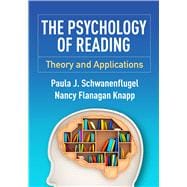Pedagogical Features
*End-of-chapter discussion questions and suggestions for further reading.
*Explicit linkages among theory, research, standards (including the Common Core State Standards), and instruction.
*Engaging case studies at the beginning of each chapter.
*Technology Toolbox explores the pros and cons of computer-assisted learning.









